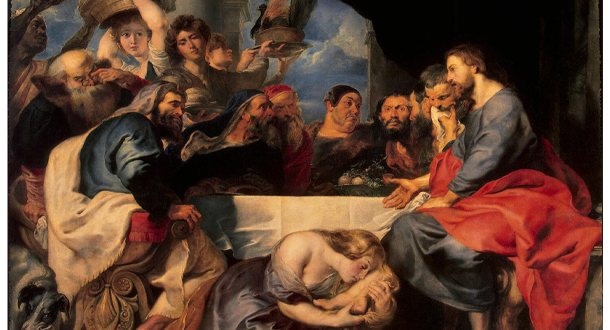
Scripture:
Reflection:
“If this man were a prophet, he would know who and what sort of woman this is who is touching him, that she is a sinner.” Jesus said to him in reply, “Simon, I have something to say to you.” -Luke 7:39-40
All of us, probably, have had the experience of walking into our home, or a classroom or a workplace and instinctively felt the chilly reception we were getting. There were no overt signals that we were not wanted or signs of disrespect. But there were many little things that spoke volumes and loudly. The lack of a sincere welcome, the abrupt change of conversation, the veneer of social niceties in words, without the warmth and happy gestures, make us wary and uncomfortable. It seems that in people’s minds, we are judged, and we have failed to meet their expectations of us as a human being, family members, friends and persons worthy of their friendship.
If we are so attuned to this kind of experience in our society, Jesus was also. Jesus knew when he was being used. Jesus knew when people were saying one thing to his face but thinking another thing behind his back. Yet, Jesus did not avoid these encounters. In fact, he seemed to welcome them. The Gospel for today’s Mass demonstrates that.
Jesus is invited to a dinner being given by a “certain Pharisee” who may have been well known for his prestige, social status and wealth. Jesus enters and reclines at the table with him. We later find out that he was not welcome with the common courtesies of the day: his feet washed, a kiss of greeting and an anointment that would certainly fill the room with a nice fragrance. We get the impression that the Pharisee was doing Jesus a great favor by having him sit at the table with him.
The other important person in this Gospel account is “a sinful woman in the city.” There could be no greater contrasts than between these two people: a man of power, prestige and wealth and a woman who was well known for her sinful life.
One of the many layers found in this Gospel passage is that of entitlement. The sense of entitlement comes more easily to people of status, wealth, power, and social standing. That doesn’t mean that all of us also have a sense of entitlement, but some are able to exercise it more easily and without impunity, without shame. The examples are legion.
Jesus’ parable within the Gospel passage shows us that all of us are indebted because all of us are sinners. No one has the right to claim superiority over another human being. All of us have sinned. All of us are in need of forgiveness. All of us depend upon God’s mercy.
God’s love for us is all-inclusive. God loved us from the time we were in our mother’s womb. The sign of God’s love for us is forgiveness.
Jesus knew how to break the cycle of social inequality. No human law can dehumanize a person and classify that person as untouchable, inferior, unforgivable, unlovable. Only the human mind and heart can do that.
This is why Jesus’ command to love one another as he loves us is so liberating. It puts us in our place: children of God and brothers and sisters to one another. We don’t have to worry if this person is worthy of our love and attention, or if this “sinner” is loved and can be forgiven by God! That is why God is God.
Those at the table with Jesus ask: “Who is this who can even forgive sins?” Thank God, it is Jesus, our Lord, and Savior!
Fr. Clemente Barrón, C.P. is a member of Mater Dolorosa Community in Sierra Madre, California.
